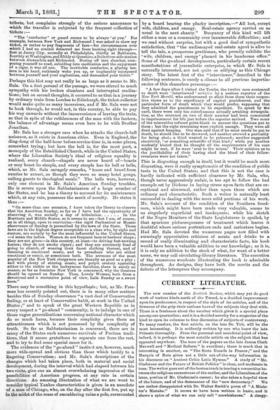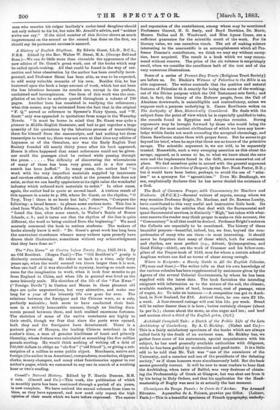CURRENT LITERATURE.
The new number of the Scottish Review, which may yet do good work of various kinds north of the Tweed, is a decided improvement upon its predecessor, in respect of the style of its articles, and of the firmness of the grip their authors have of the subjects they deal with. There is a freshness shoat the number which gives it a special place among our quarterlies; and it is a decided novelty for a magazine of the kind to open its columns to free discussion of subjects of controversy. To many readers, the first article, on the late Dr. Tait, will be the most interesting. It is evidently written by one who knew the late Primate thoroughly. From the personal and anecdotal point of view, indeed, it is perhaps the most notable article on the subject that has appeared anywhere. The tone of the papers on the late James Clerk Maxwell and "Medical Reform" is excellent ; there is much that is interesting in another, on "The Scots Guards in France ;" and the Marquis of Bate gives not a little out-of-the-way information in his discourse on "Ancient Celtic Latin Hymns." A study of "Mr. Gladstone and the Future of British Politics " is clear, and moderate in tone. The writer goes out of the beaten track in tracing a connection be- tween the religions earnestness of the earlier, and the Liberalism of the later, portion of Mr. Gladstone's career; he also takes a hopeful view of the future, and of the demeanour of the "new democracy." We are rather disappointed with Dr. Walter Smith's poem of "A Minis-
ter's Mistake." It seems to have been written in haste, and it shows a spice of what we can only call " mawkishness." A clergy- man who marries his vulgar landlady's under-bred daughter-should not only submit to his lot, but take Mr. Arnold's advice, and "neither strive nor cry." If the third number of this Review shows as much improvement on the second as the second has done on the first, we should say its permanent success is assured.



































 Previous page
Previous page